Modern Languages: French

French Curriculum map
The acquisition of a Foreign Language is a skill which helps develop confidence and trains the memory. Learning a foreign language is an important part of the curriculum and helps develop many transferable and life-long learning skills. It also helps to foster essential values such as open-mindedness, acceptance and tolerance.
The ability to use languages at work is increasingly required by employers and language skills are becoming an essential part of life in the global marketplace.
Key Stage 3
Year 7 and Year 8 pupils learn French at Stalham. We follow the Dynamo course covering a range of topics and skills in line with the national curriculum. Pupils will continue with French until at least the end of Year 8 whereby pupils are strongly recommended to continue a language to GCSE. The GCSE course in French builds on the skills and grammatical understanding developed in Key Stage 3.
The GCSE Exam
First teaching of the new AQA GCSE course in French began in September 2016. The papers will be in Listening (25%), Reading (25%), Speaking (25%) and Writing (25%). Students must sit all four at either Higher or Foundation level, not a mixture of the two. Higher tier grades range from 4 to 9, whilst Foundation tier grades range from 1 to 5.
Listening - In the Listening Exam students will hear short items such as announcements, short conversations, instructions, news bulletins and telephone messages from suitable adapted authentic sources and answer questions on them.
Reading - The Reading Exam will consist of a variety of longer and shorter written texts from items such as brochures, guides, newspapers, websites, magazines and literary texts. There will also be a short translation task from French into English
Speaking - The Speaking Exam will consist of a short two minute role play based on a stimulus card, a discussion of one of the GCSE topics prompted by a photo card (two minutes at Foundation Level and three minutes at Higher Level) and then a general conversation on two further GCSE topics (about four minutes at Foundation Level and about 6 minutes at Higher Level)
Writing - At Foundation Level students will write a message, a short paragraph and a structured essay and short phrases to be translated from English into French.
You can find out more about GCSE French including the specification and exam structure by clicking on the link https://www.aqa.org.uk/subjects/languages/gcse/french-8658
Revision Guides
We recommend the Revise AQA GCSE Revision Guides and Revision Workbooks by Pearson. Students can either order these through school in Year 10 or privately for a cost or around £3 with a schools discount.
CGP also produce a GCSE AQA revision guide and exam practice book for about £6.
Apps
Memrise – language learning app, free to download. Takes you through lots of vocab.
Quizlet – free app. Lots of study sets available to practise through various activities.
Duolingo – another free app. Useful for the basics.
Careers
Learning a language is not just about being able to travel and communicate with others. Many employers value a language GCSE for the transferable skills that it provides. Employers from a vast range of industries seek students with a language GCSE e.g. working in the oil and gas sector for Shell or Artificial Intelligence, and there are many many more….
Click the link for the Norfolk work and skills booklet and see how many employers and sectors want a language GCSE (you’ll be surprised)!
https://helpyouchoose.org/content/advisers/norfolk-work-skills/2019-norfolk-work-skills/
See the attached posters to see where a language could take you…
https://helpyouchoose.org/content/advisers/norfolk-work-skills/norfolk-work-skills-key-sector-posters/









